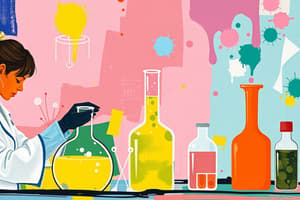Podcast
Questions and Answers
What should students do if they do not understand a direction during a laboratory class?
What should students do if they do not understand a direction during a laboratory class?
- Proceed with the activity anyway.
- Wait until the end of class to ask.
- Ask the teacher for clarification before proceeding. (correct)
- Ignore the direction.
Why is it important to keep hands away from the face and mouth while using chemicals?
Why is it important to keep hands away from the face and mouth while using chemicals?
- To avoid contamination and accidental ingestion of substances. (correct)
- To maintain focus on the task at hand.
- To prevent distractions during the experiment.
- To keep the laboratory area clean.
What is the proper action if a student feels the need for a break during laboratory work?
What is the proper action if a student feels the need for a break during laboratory work?
- Take a break at their workstation.
- Leave the laboratory without informing the teacher.
- Stand up and stretch in the lab.
- Request permission from the teacher to step out. (correct)
What items should students bring to the laboratory?
What items should students bring to the laboratory?
What is the consequence of consuming food or beverages in the laboratory?
What is the consequence of consuming food or beverages in the laboratory?
What personal protective equipment is required when using chemicals in the laboratory?
What personal protective equipment is required when using chemicals in the laboratory?
How should waste be disposed of in the laboratory?
How should waste be disposed of in the laboratory?
What should students do with long hair during laboratory activities?
What should students do with long hair during laboratory activities?
What type of clothing is prohibited in the laboratory?
What type of clothing is prohibited in the laboratory?
When handling chemicals, what is the safest practice regarding your skin?
When handling chemicals, what is the safest practice regarding your skin?
What should you do if you do not understand how to use a piece of equipment?
What should you do if you do not understand how to use a piece of equipment?
Which of the following is NOT a correct procedure when pouring chemicals?
Which of the following is NOT a correct procedure when pouring chemicals?
In the event of an accident, what is the first step you should take?
In the event of an accident, what is the first step you should take?
What is the appropriate action when dealing with broken glassware?
What is the appropriate action when dealing with broken glassware?
How should you correctly waft a vapor towards your nose?
How should you correctly waft a vapor towards your nose?
What is the correct procedure for using a burner in the laboratory?
What is the correct procedure for using a burner in the laboratory?
Flashcards are hidden until you start studying
Study Notes
General Guidelines
- Students must work under teacher supervision at all times.
- Follow all instructions; seek clarification from the teacher if needed.
- Don’t touch equipment or materials until explicitly instructed.
- Come prepared by reading all relevant procedures before class.
- Food and beverages are prohibited; laboratory glassware cannot be used for consumption.
- Laboratory activities should be monitored continuously; do not distract others or wander.
- Familiarize yourself with emergency locations, including medicine cabinets and fire exits.
- Maintain cleanliness; only bring necessary materials and ensure aisles are clear.
- Keep hands away from face while using chemicals; wash hands after experiments.
- Dispose of waste properly; use sinks only for water and diluted substances.
Dress Code
- Eyewear protection is mandatory when using chemicals or glassware; avoid contact lenses.
- Wear laboratory gowns or aprons; secure long hair with ties or hairnets.
- Use gloves when necessary.
- Long pants and closed-toe shoes are required; shorts, sandals, and slippers are not allowed.
Accidents and Injuries
- Know where all emergency devices are located and how to use them.
- Report any accidents or injuries to the teacher or technician immediately.
Handling Chemicals and Equipment
- Treat all chemicals as hazardous; avoid skin contact.
- Never taste chemicals or smell directly; waft vapors towards the nose if directed.
- Always read container labels twice before usage and only take needed amounts.
- Avoid returning unused chemicals to original containers.
- Use proper techniques for opening and pouring; cover containers after use.
- Work in fume hoods for corrosive substances.
- Measure reagents at their designated area rather than moving them to workstations.
- Always pour acids into water to prevent splattering.
- Inspect glassware for damage before use; avoid using broken or dirty items.
- Seek assistance from the teacher if unsure about equipment operation.
- Never leave burners unattended; avoid using improvised lighting methods.
- Use appropriate glassware for heating to ensure accurate measurements.
Studying That Suits You
Use AI to generate personalized quizzes and flashcards to suit your learning preferences.




